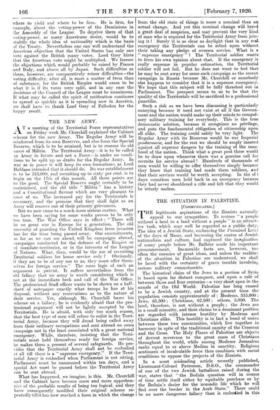THE NEW ARMY.
AT a meeting of the Territorial Force representatives on Friday week Mr. Churchill explained the Cabinet scheme for the new Army. The Regular Army will be reinforced from its own Reserves, and also from the Special Reserve, which is to be retained, but is to resume its old name of Militia. The Territorial Army—it is to be called an Army in future and not a Force—is under no condi- tions to be split up as drafts for the Regular Army. In war as in peace it will keep its own formations, as Lord Haldane intended that it should do. Its war establishment is to be 345,000, and recruiting up to sixty per cent. is to begin on the 17th of this month. All these points are to the good. The Special Reserve ought certainly to be maintained, and the old title " Militia " has a history and a Constitutional flavour which are very pleasant to most of us. The increased pay for the Territorials is necessary, and the promise that they shall fight as an Army will remove one of their primary grievances.
But we now come to a much more serious matter. What we have been saying for some weeks proves to be only too true. The War Office says in effect : " There will be no great war in Europe for a generation. The old necessity of guarding the United Kingdom from invasion has for the time being passed away. Our commitments, 30 far as we can see ahead, will be campaigns abroad, campaigns conducted for the defence of the Empire or of mandate-territories, or in the interests of the League of Nations. What, then, would be the use of recruiting Territorial soldiers for home service only ? Obviously, if they are to be of any use to us, they must offer them- selves for foreign service." The mere logic of such an argument is patent.. It suffers nevertheless from the old fallacy that no army is worth considering which is not at the immediate beck and call of the War Office. The professional Staff officer wants to be shown on a half- sheet of notepaper exactly what troops he has at his disposal, without any reservations as to the nature of their service. Yet, although Mr. Churchill bases his scheme on a fallacy, he is evidently afraid that the pro- fessional argument will not be lightly accepted by the Territorials. He is afraid, with only too much reason, that the best type of men will refuse to enlist in the Terri- torial Army, because they will dread being called away from their ordinary occupations and sent abroad on some campaign not in the least associated with a great national emergency. While, therefore, insisting that the Terri- torials must hold themselves ready for foreign service, he makes them a present of several safeguards. He pro- vides that the Territorial Army shall not be embodied at all till there is a " supreme emergency." If the Terri- torial Army is embodied when Parhament is not sitting, Parliament must be summoned within ten days, and a special Act must be passed before the Territorial Army can be sent abroad.
What has happened, we imagine, is this. Mr. Churchill and the Cabinet have become more and more apprehen- sive of the probable results of being too logical, and they have consequently modified their original scheme re- peatedly till it has now reached a form in which the change from the old state of things is more a nominal than an actual change. And yet this nominal change will breed a great deal of suspicion, and may prevent the very kind of man who is required for the Territorial Army from join- ing it I Surely it is as clear as daylight that in any real emergency the Territorials can be relied upon without their taking any pledge of oversee service. What is a " supreme emergency " ? The Territorial soldier wants to form his own opinion about that. If the emergency is really supreme in popular estimation, the Territorial soldier will not fail. But he does not want to feel that he may be sent away for some such campaign as the recent campaign in Russia because Mr. Churchill or somebody else happens to consider that it is a supreme emergency. We hope that this subject will be fully thrashed out in Parliament. The prospect seems to us to be that the quality of the Territorials will be sacrificed to a professional punctilio.
Such a risk as we have been discussing is particularly annoying because it need not exist at all if the Govern- ment and the nation would make up their minds to compul- sory military training for everybody. This is the true democratic solution, because it recognizes no privilege, and puts the fundamental obligation of citizenship upon all alike. The training could safely be very light. The Regular Army with its Reserves would be our Imperial gendarmerie, and for the rest we should be amply insured against all supreme dangers by the training of the man- hood of the nation. Think what a great pool there would be to draw upon whenever there was a genuine call for recruits for service abroad ! Hundreds of thousands of men would be willing to offer themselves simply because they knew that training had made them soldiers, and that their services would be worth accepting. In the ol:1 days countless men held back in an emergency because they had never shouldered a rifle and felt that they would be utterly useless.






































 Previous page
Previous page